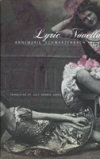Lyric Novella
Lyric Novella, by Swiss writer Annemarie Schwarzenbach, was published in 1933. The novella is slim. This edition, translated by Lucy Renner Jones, adds more weight with a translator’s introduction and an afterword that examines Schwarzenbach’s life and literary influences. I wanted, first, to let this lyric of youth and obsessive love stand on its own, to be convinced by the writing rather than be influenced by all the interpretation.
Lyric Novella, by Swiss writer Annemarie Schwarzenbach, was published in 1933. The novella is slim. This edition, translated by Lucy Renner Jones, adds more weight with a translator’s introduction and an afterword that examines Schwarzenbach’s life and literary influences. I wanted, first, to let this lyric of youth and obsessive love stand on its own, to be convinced by the writing rather than be influenced by all the interpretation.
The narrator has fled from Berlin to a small country town where he seeks to write about and recover from a romantic fiasco. He daydreams that his love, Sibylle, will his read his words and find them worthy. In his early twenties, he is of the haute-bourgeoisie, is well connected through an industrial family, and is being groomed for foreign service. Sibylle works as a cabaret singer and seems erratic, elusive, and out of reach. To be with her, he endangers his studies, his promising future, and his health. There are other suitors, older and more experienced. We get few clues as to what drives her. The young man does not try to consummate his passion but creates a drama focused exclusively on his own hopes.
In a critical moment, he discovers that Sibylle is not just driven by wild whims. She is struggling with tragic circumstances unrelated to him: the threatened loss of a beloved adopted child. “She had been preoccupied by something quite different. And now I’d found out and I felt empty when I should have felt almost relieved . . .” The child’s father, probably a lover, has been arrested. The narrator makes a fumbled attempt to intervene and help Sibylle, which backfires. “She came to the phone and told me I shouldn’t have done anything without asking her. ‘Perhaps you’re about to send the police over here,’ she said.” Sibylle flees Berlin altogether to avoid dealing the authorities. At the end, the narrator considers running away to the sea or returning to Berlin, back to his comforts, back to Sibylle’s theater:
And then, all of a sudden, it hits me with force: Sibylle won’t be there any more. . . . How could I forget this? I’d gone away, knowing what that means. But it hadn’t been clear to me. . . . So this is sacrifice and justice. But I don’t understand the first thing about it; I am just blind with pain. . . .
I won’t drive to the sea.
I won’t drink with sailors.
I won’t give Sibylle these pages.
When I return, she won’t be there.
It is hard to be patient with this narcissism.
Schwarzenbach creates this unreliable voice while situating the question of blindness in a larger context that goes beyond weatherworn romantic tropes. The time is late Weimar Germany. The narrator wanders through the woods and follows after a fleeing rabbit and feels its nest: “A trace of animal warmth remained that I felt with an unfamiliar tremor. I lowered my face and nestled it there, feeling a tiny breath, almost like a human breast.” This tender moment gives way to excitement in the village when the annual hunt opens, though festivities are apparently not as grand as before the war. The local upper class prepares to go out with guns and dogs to shoot and kill the forest fauna. Hunting jargon, the narrator admits, is not unfamiliar from his “other” life, which he now eschews. He thinks of Sibylle defending an old starving dog from the cruelty of its owner.
By 1933, the social class from which this youth comes had already lost control of Hitler. They meant to use him, but he used them instead. In the local café is a portrait of Bismarck. “I walk slowly through the little town. . . . People are gathered in front of a shop, I hear a loudspeaker from a far announcing the weather. Then the daily news follows and a waltz begins . . .” What might the news have been? It is chilling to wonder but of no interest to the narrator.
Schwarzenbach struggled as a closeted lesbian and is said to have hinted later that this protagonist was a really a woman. For me, the gender ambiguity seems of lesser importance than the picture she creates of youth and class. Hiking to an old castle, the narrator finds a plaque listing honored fallen officers of Frederick the Great. “I am ashamed, I wish I had a sword . . . I read the name of my ancestors.” We know, and the author must have sensed, that soon enough this wish for a sword would be fulfilled. The protagonist nurses loneliness and turmoil of the self. Schwarzenbach doesn’t hide her understanding of romantic myopia, made more powerful for the indirection and subtlety used to show what the protagonist refuses to see, yet that is all around him.





